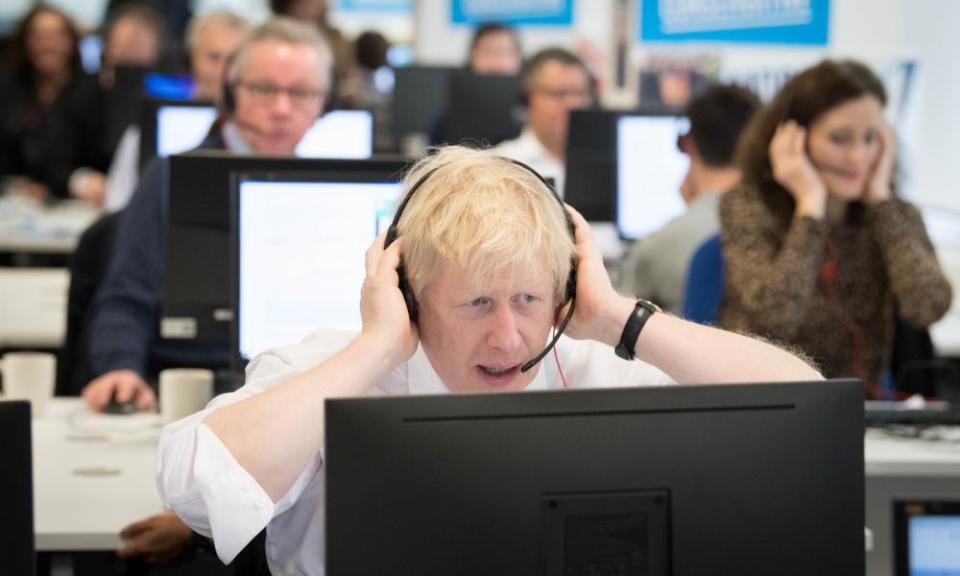Critics attack Johnson's plan for 'Australian-style' migration system

Boris Johnson’s proposed “Australian-style” points system to reduce immigration has been criticised for failing to understand how vital low and medium-skilled jobs are to the UK economy and for giving a false impression to voters of radical change.
The scheme would separate future immigrants into three tiers with entry for exceptional and talented people, skilled workers with a job offer, and unskilled for short-term schemes.
Jonathan Portes, a professor of economics at King’s College London and senior fellow at the research group UK in a Changing Europe, said: “It’s not radical. Most likely it will not look that different from what we have now.
“There’s a damaging misconception in this debate that there’s a binary divide between the brain surgeons and the people who pick strawberries – most ordinary immigrants are somewhere in between. Doing jobs that require skills but aren’t necessarily highly skilled, and they would not pass this particular test.
“Butchers, for example, or people who work in abattoirs – this is hard work and you need training. Most come from eastern Europe but are unlikely to make the highly skilled cut.”
He said “Australian-style” was a phrase that performed well in focus groups, which is why Labour’s then immigration minister, Liam Byrne, chose to use it as far back as 2007, because it implies regulation and control, yet Johnson’s plans do not include the one element that would make it distinctly Australian, Portes said.
“If you score certain points for your qualifications then Australia will let you in without a job offer. Johnson isn’t proposing that for the UK. If he was then that would be radical,” he said.
Madeleine Sumption, the director of the Migration Observatory at Oxford University, said Johnson’s proposals went “roughly in the direction we were expecting the system to be heading [after Brexit] anyway”.
She said they equated to “a relatively mainstream immigration system of the kind that you would find in relatively high income countries that don’t have free movement”.
Sumption added: “It’s a lot more restrictive than free movement, so for certain employers there would still probably be difficulties transitioning from a system where there’s no bureaucracy attached and where they can hire people very easily to one where they’d have to hire people temporarily or not at all.
“I don’t want to suggest that there’s no change. It is a more restrictive system than the one we have now, on the whole. But, by international standards, I would say it’s a relatively mainstream system.”
Johnson had earlier been accused of lying to voters over his election pledge to reduce immigration levels. The shadow health secretary, Jonathan Ashworth, said the EU’s free movement of people had been good for the UK, and criticised the prime minister’s proposal to give the migration advisory committee (MAC) the power to set quotas and hand out visas.
“He is misleading the British people, because he’s tried to give the impression he’s going to bring immigration down, but when you look at the details of what he has announced today, he is saying you’ve got to hand over decisions on who will get a visa to an independent committee,” Ashworth told Sky’s Sophy Ridge on Sunday.
“There will be no accountability over any decision that any immigration minister makes, because they will be handed over to a statutory independent committee. So again, Boris Johnson is lying to the British people.”
As well as an enhanced role for the MAC, the Conservatives will publish an annual report on how to reduce the level of immigration.
Johnson has insisted the Tories will bring down numbers. Net migration was 258,000 in 2018.
Asked if he was happy for immigration to go up, Ashworth said: “If the economy needs it then of course people should come here to work.”
He also highlighted the government’s decision to extend the fee for workers from abroad to use the NHS, even if they are staff members, to workers who migrate to the UK from the EU27 after Brexit.
“We should have a fair and balanced immigration system, of course we should, but he is imposing a tax on nurses coming from the EU and beyond to come and work here in our NHS, to care for our sick and our elderly,” Ashworth said, adding that this would exacerbate the NHS staffing crisis.

 Yahoo News
Yahoo News 